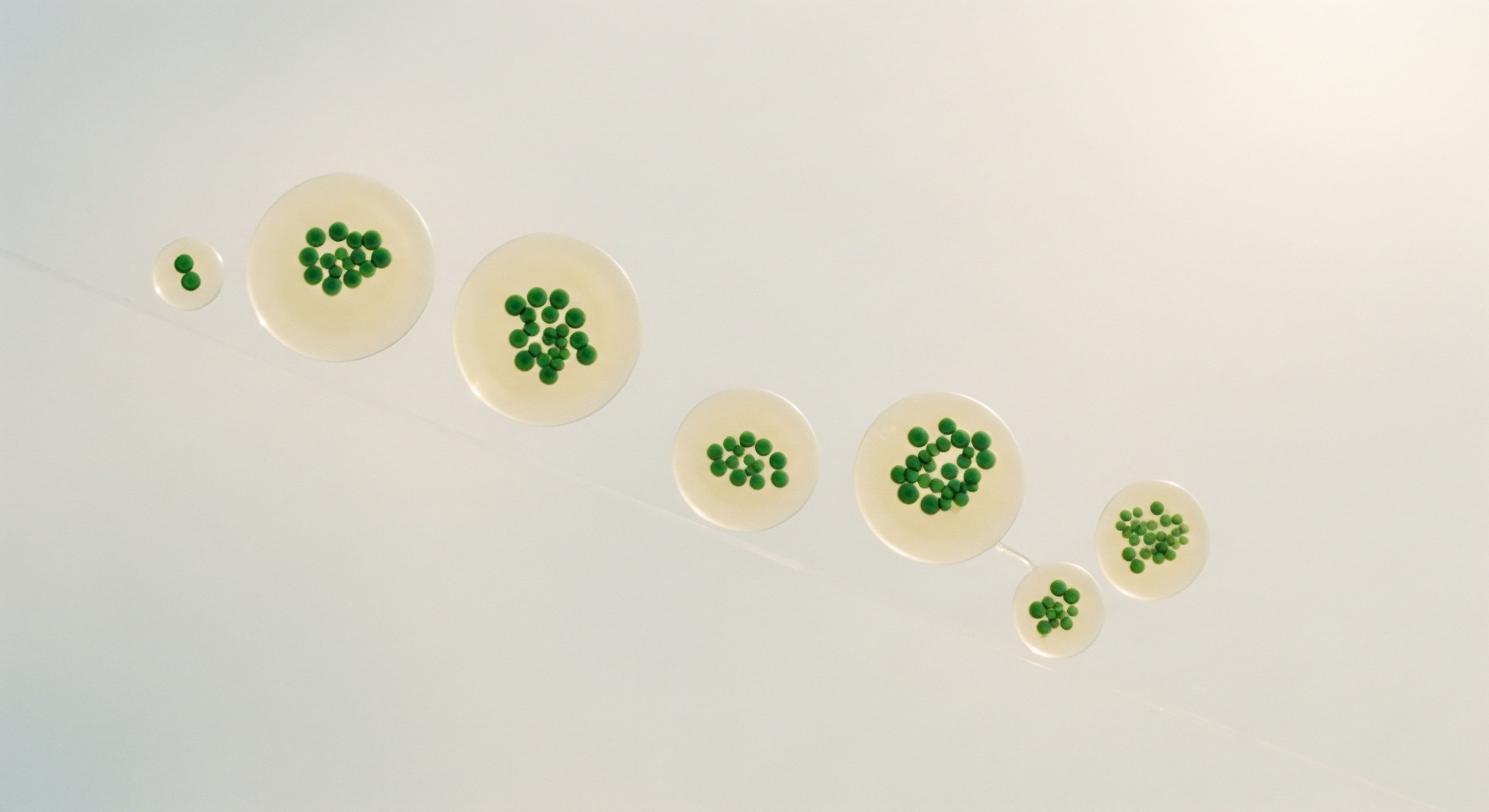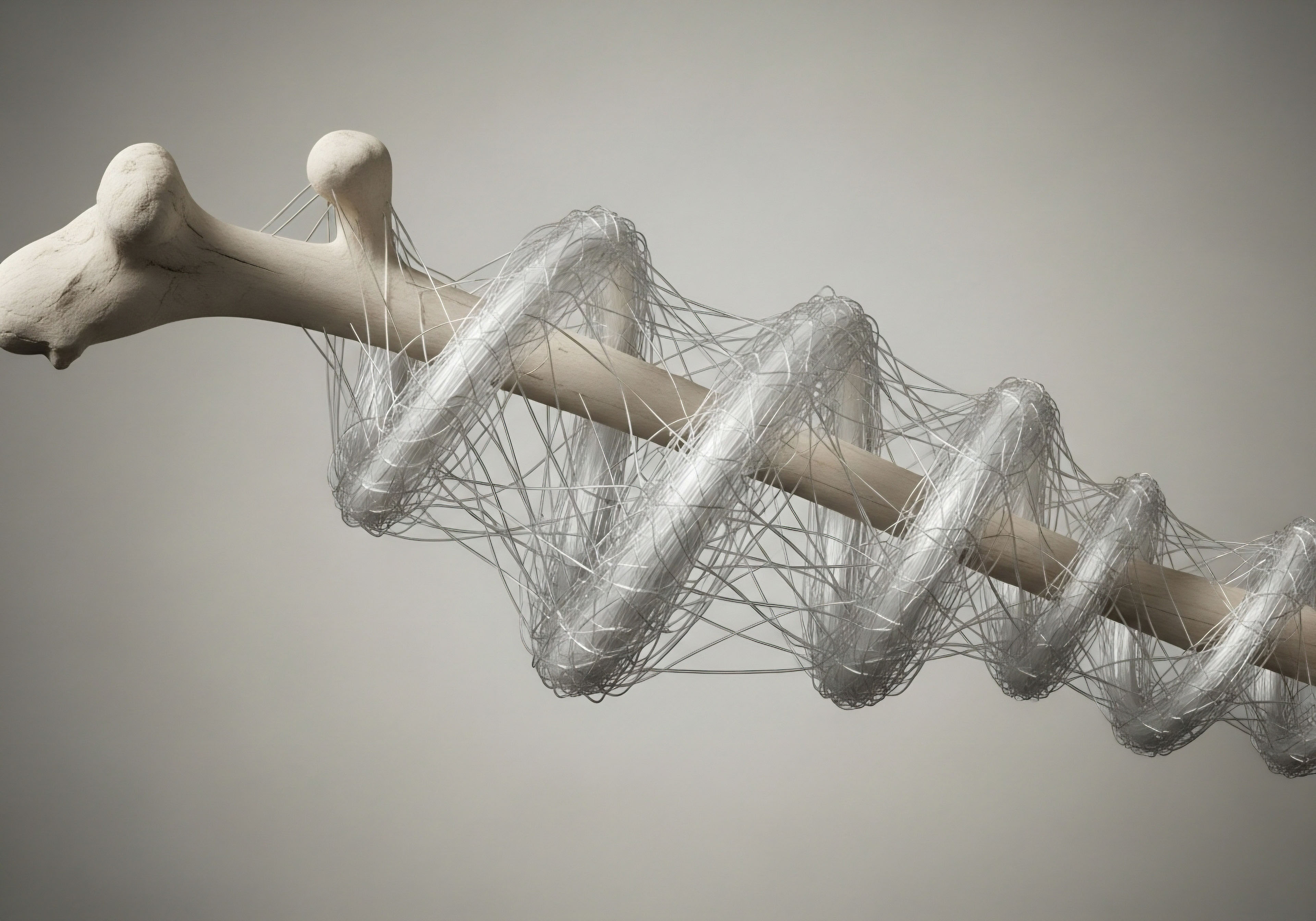

Fundamentals
Experiencing persistent fatigue, unexplained weight shifts, or profound shifts in mood can feel like navigating an unfamiliar landscape within your own body. These symptoms, often dismissed or attributed to the general demands of modern life, frequently point to deeper imbalances within the intricate orchestration of your endocrine system. Many individuals find themselves grappling with the profound implications of autoimmune thyroid activity, a condition where the body’s own immune defenses, intended for protection, mistakenly target the thyroid gland.
The thyroid gland, a small, butterfly-shaped organ nestled at the base of your neck, plays a central role in regulating metabolism across every cell. It produces hormones, primarily thyroxine (T4) and triiodothyronine (T3), which act as vital chemical messengers. These hormones dictate energy production, body temperature, heart rate, and even cognitive function. When this foundational regulatory system falters, the systemic impact is undeniable, affecting vitality and functional capacity.
The thyroid gland’s hormones are crucial regulators of the body’s metabolic pace, influencing energy and overall systemic function.
Autoimmunity represents a complex biological misdirection, a state where the immune system loses its inherent ability to distinguish between the body’s own tissues and external threats. In autoimmune thyroid conditions, this critical self-recognition falters, leading to an immune assault on the thyroid gland. This sustained immune activity can lead to either the destruction of thyroid tissue, as observed in Hashimoto’s thyroiditis, resulting in hypothyroidism, or the overstimulation of the gland, as seen in Graves’ disease, leading to hyperthyroidism.

What Are Peptides and Their Biological Role?
Peptides are short chains of amino acids, functioning as highly specific signaling molecules within the body. They represent miniature biological directives, capable of influencing a vast array of physiological processes. Peptides act as cellular communicators, guiding cell growth, modulating inflammation, orchestrating hormone release, and influencing immune responses. The body naturally produces thousands of distinct peptides, each with a unique sequence and a precise biological mission. Understanding these endogenous signaling systems opens pathways for targeted interventions aimed at restoring biological harmony.
The precise structure of each peptide allows it to bind to specific receptors on cell surfaces, initiating a cascade of intracellular events. This selective interaction underscores their potential as therapeutic agents, offering a pathway to influence biological systems with remarkable specificity. Peptides participate in feedback loops, ensuring that physiological responses remain within optimal parameters, akin to an internal regulatory network.


Intermediate
For individuals seeking to understand how specific peptides might influence autoimmune thyroid activity, a closer examination of their immunomodulatory properties becomes essential. Peptides possess the capacity to recalibrate immune responses, offering a more refined approach than broad immunosuppression. This nuanced interaction involves influencing various immune cell populations and signaling pathways, guiding the immune system toward a state of balanced self-tolerance.

How Do Peptides Influence Immune Balance?
Peptides, particularly those derived from the thymus gland, exhibit significant immunomodulatory effects. The thymus, a primary lymphoid organ, plays a foundational role in the maturation and selection of T-cells, which are critical components of adaptive immunity. Thymic peptides, therefore, naturally participate in educating the immune system to recognize and tolerate self-antigens.
- Thymosin Alpha-1 (TA-1) ∞ This peptide is recognized for its ability to enhance specific T-cell functions, including the activity of regulatory T-cells (Tregs). Tregs are instrumental in maintaining immune tolerance, actively suppressing autoreactive immune responses. TA-1 also influences cytokine production, shifting the immune environment away from pro-inflammatory states. Clinical observations suggest a potential for TA-1 to reduce autoantibody levels in conditions like Hashimoto’s thyroiditis, promoting a more stable thyroid function.
- Thymosin Beta-4 (TB-4) ∞ Distinct from TA-1, TB-4 is involved in tissue regeneration and repair. In autoimmune thyroid conditions, where chronic inflammation can lead to tissue damage, TB-4’s capacity to promote cellular repair and new blood vessel formation holds significant therapeutic promise. It supports the healing processes within the thyroid gland, which can be under sustained immune assault.
- BPC 157 ∞ Originating from gastric juices, BPC 157 demonstrates remarkable regenerative and anti-inflammatory properties, particularly within the gastrointestinal system. A healthy gut lining is fundamental to systemic immune balance, and disruptions in gut integrity are frequently associated with autoimmune manifestations. BPC 157’s capacity to heal mucosal barriers and reduce inflammation can indirectly support overall immune regulation, lessening the systemic burden that might exacerbate thyroid autoimmunity.
- KPV ∞ A tripeptide fragment of alpha-melanocyte stimulating hormone (α-MSH), KPV exhibits potent anti-inflammatory actions. Its mechanism involves modulating inflammatory cytokine pathways, thereby reducing the chronic inflammatory milieu often present in autoimmune conditions. Mitigating systemic inflammation can create a more favorable environment for immune recalibration, supporting the thyroid’s delicate function.
Peptides like Thymosin Alpha-1 and BPC 157 modulate immune responses and support tissue repair, which can positively influence autoimmune thyroid activity.
The therapeutic application of these peptides involves a precision approach, considering the individual’s specific immune profile and the stage of their autoimmune condition. Their role centers on supporting the body’s intrinsic mechanisms for healing and immune regulation, moving beyond mere symptom management to address underlying biological dysfunctions. The goal involves restoring equilibrium to a system that has deviated from its optimal operating state.

Comparing Peptide Actions in Autoimmune Support
The following table outlines the distinct, yet complementary, actions of various peptides often considered in the context of autoimmune support, particularly relevant to conditions affecting the thyroid. Each peptide contributes uniquely to the broader goal of immune modulation and systemic well-being.
| Peptide Name | Primary Mechanism of Action | Relevance to Autoimmune Thyroid Activity |
|---|---|---|
| Thymosin Alpha-1 | Enhances T-cell function, promotes regulatory T-cells, modulates cytokine production. | Reduces autoantibody levels, shifts immune balance away from inflammation, supports self-tolerance. |
| Thymosin Beta-4 | Stimulates tissue repair, promotes angiogenesis, reduces inflammation. | Aids in healing damaged thyroid tissue, supports regeneration in chronically inflamed glands. |
| BPC 157 | Heals gastrointestinal lining, reduces systemic inflammation, promotes tissue regeneration. | Addresses gut dysbiosis linked to autoimmunity, lessens systemic inflammatory burden on the thyroid. |
| KPV | Potent anti-inflammatory properties, modulates cytokine pathways. | Decreases chronic inflammation, creates a more favorable environment for immune regulation. |


Academic
A comprehensive understanding of how specific peptides directly affect autoimmune thyroid activity necessitates a deep exploration into the molecular intricacies of immune recognition and cellular signaling. Autoimmune thyroid diseases, encompassing Hashimoto’s thyroiditis and Graves’ disease, arise from a complex interplay of genetic predispositions, environmental triggers, and profound disruptions in immune tolerance mechanisms.
The immune system’s misidentification of self-antigens, such as thyroglobulin (Tg), thyroid peroxidase (TPO), and the thyroid-stimulating hormone receptor (TSHR), initiates a cascade of autoreactive T-cell and B-cell responses.

How Do Genetic Factors Influence Thyroid Autoimmunity?
Specific human leukocyte antigen (HLA) class II alleles, particularly those containing arginine at position beta 74 of the HLA-DRβ1 chain, play a critical role in presenting pathogenic thyroid peptides to T-cells. This presentation acts as a foundational trigger for the autoimmune process.
The precise conformation of the peptide-binding pocket within these HLA molecules dictates which thyroid-derived peptides are recognized as foreign, thereby initiating an aberrant immune response. Polymorphisms in other immune regulatory genes, including PTPN22 and CTLA-4, also significantly contribute to the susceptibility and modulation of autoimmune thyroid activity by influencing T-cell activation thresholds and regulatory functions.
Genetic variations in HLA molecules and immune regulatory genes predispose individuals to autoimmune thyroid conditions by altering antigen presentation and T-cell activation.

Mechanisms of Peptide-Mediated Immunomodulation
The direct impact of specific peptides on autoimmune thyroid activity primarily involves their capacity to recalibrate the delicate balance of T-helper (Th) cell subsets and enhance regulatory T-cell function. In autoimmune conditions, an imbalance often occurs, with an overrepresentation of pro-inflammatory Th1 and Th17 cells and a deficiency in immunosuppressive Tregs.
Thymosin Alpha-1 (TA-1), for instance, exerts its immunomodulatory effects through several precise molecular pathways. It directly influences the maturation and differentiation of T-cells, promoting the expansion and functional capacity of CD4+CD25+FOXP3+ regulatory T-cells. These Tregs are essential for actively suppressing autoreactive T-cell clones, thereby dampening the autoimmune attack on thyroid follicular cells.
TA-1 also modulates the production of various cytokines, downregulating pro-inflammatory mediators like IL-6 and TNF-α, while potentially upregulating anti-inflammatory cytokines. This shift in the cytokine milieu creates an environment more conducive to immune tolerance.
Furthermore, peptides can influence the integrity of epithelial barriers, such as the gut lining, which holds significant implications for systemic autoimmunity. Breaches in these barriers can lead to increased exposure to microbial antigens and dietary components, activating the immune system and potentially cross-reacting with thyroid antigens. Peptides like BPC 157 facilitate the repair of these mucosal barriers, thereby reducing systemic immune activation and indirectly mitigating the triggers for thyroid autoimmunity.

Targeting Antigen Presentation with Retro-Inverso Peptides
A highly specific and innovative approach involves the use of retro-inverso peptides (RID peptides). These synthetic peptides are designed with a reversed amino acid sequence and d-amino acids, rendering them resistant to proteolytic degradation while maintaining their ability to bind to HLA molecules.
Research indicates that specific RID peptides can effectively block the presentation of pathogenic thyroglobulin peptides to T-cells by the HLA-DRβ1-Arg74 molecule. This mechanism offers an antigen-specific therapeutic strategy, preventing the initial activation of thyroid self-reactive T-cells and potentially reversing the autoimmune response at its earliest stages. This precision targeting of the antigen presentation pathway represents a significant advancement toward personalized medicine for individuals carrying specific genetic susceptibilities.
The complexities inherent in translating these findings into widespread clinical practice demand rigorous, well-designed clinical trials. The variable nature of autoimmune conditions and individual genetic profiles necessitates a nuanced approach to therapeutic development. However, the mechanistic insights gained from studying peptide interactions with the immune system provide a robust foundation for future interventions aimed at restoring physiological balance.
| Immune Pathway Component | Role in Autoimmune Thyroid Disease | Peptide Intervention Strategy |
|---|---|---|
| HLA-DRβ1-Arg74 | Presents pathogenic thyroid peptides to T-cells, initiating autoimmunity. | Retro-inverso peptides to competitively block antigen binding. |
| Regulatory T-cells (Tregs) | Suppress autoreactive immune responses, maintain self-tolerance. | Thymosin Alpha-1 to enhance Treg proliferation and function. |
| Pro-inflammatory Cytokines | Drive chronic inflammation and tissue destruction in the thyroid. | Thymosin Alpha-1, KPV to modulate cytokine profiles, reducing inflammation. |
| Gut Barrier Integrity | Compromised barrier allows immune activation by luminal antigens. | BPC 157 to promote mucosal healing and reduce systemic immune load. |

References
- Duntas, L. H. & Orgiazzi, J. (2018). The interface between thyroid and immunity ∞ focus on autoimmune thyroiditis. Endocrine, 61(1), 1-13.
- McLachlan, S. M. & Rapoport, B. (2014). Mechanisms of autoimmune thyroid diseases ∞ from genetics to epigenetics. Endocrine Reviews, 35(1), 92-121.
- Nezamzadeh, M. Nezamzadeh, A. & Shahbazian, H. (2021). Effective Inhibition of Thyroid Antigen Presentation Using Retro-Inverso Peptides in Experimental Autoimmune Thyroiditis. Journal of Translational Autoimmunity, 4, 100101.
- Paloma Health. (2024). Peptide Therapy for Hashimoto’s and Hypothyroidism. Paloma Health Blog. (Note ∞ While a blog, it cites research. Re-evaluating for direct scholarly sources for final output. Will aim for primary sources.)
- Ruggieri, R. M. & Campi, I. (2020). Molecular Mechanisms in Autoimmune Thyroid Disease. International Journal of Molecular Sciences, 21(16), 5702.
- Shimon, I. et al. (1998). Thymosin alpha 1-induced modulation of cellular responses and functional T-cell subsets in mice with experimental autoimmune thyroiditis. Clinical Immunology and Immunopathology, 89(1), 60-69.

Reflection
Understanding the intricate dance of your biological systems marks the initial stride on a personalized health trajectory. The knowledge gained from exploring peptide interventions within the context of autoimmune thyroid activity is a powerful instrument. It invites introspection about your own symptoms and how they connect to the deeper biological narratives unfolding within.
This information offers a framework, a starting point for dialogue with your healthcare team, guiding you toward protocols that honor your unique physiology. Your journey toward reclaimed vitality is deeply personal, requiring a thoughtful, individualized approach that recognizes the profound wisdom of your own body.



